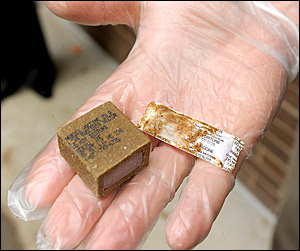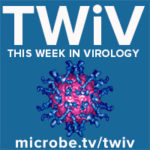 Hosts:Vincent Racaniello, Alan Dove, Rich Condit, Gustavo Palacios, and Mady Hornig
Hosts:Vincent Racaniello, Alan Dove, Rich Condit, Gustavo Palacios, and Mady Hornig
A TWiV panel of five considers the finding of Streptococcus pneumoniae in fatal H1N1 cases in Argentina, hysteria in the Ukraine over pandemic influenza, and human vaccinia infection after contact with a raccoon rabies vaccine bait.
Click the arrow above to play, or right-click to download TWiV #59 (58 MB .mp3, 80 minutes)
Subscribe (free): iTunes, RSS, email
Links for this episode:
- Argentine flu death mystery
- H1N1 influenza outbreak in Ukraine (article one and two, and WHO statement)
- Human vaccinia infection after contact with rabies vaccine bait
- Agrippal S1 inactivated H1N1 vaccine (pdf – thanks Ariel and Ayelet)
- Nick’s letter on viruses and life
- Take the poll: are viruses alive?
Weekly Science Picks
Rich Longitude by Dava Sobel
Alan Heil Pro Set Media Headset (for a good price, order from a ham radio store)
Vincent MicrobeWorld app for iPhone and iTouch (iTunes or MicrobeWorld)
Send your virology questions and comments to [email protected].


I have been listening to your show and enjoy it a great deal.
I have some thoughts regarding the ongoing debate over whether or not viruses are alive.
It's true that viruses need to be inside a living organism to reproduce, but all living things require a specific environment. Seeds require more than water to turn into a plant: they require nutriants, light, and a specific temperature range.
Even more to the point, certain species of wasp must plant their eggs inside spiders. They need living spiders to reproduce, but it's hard to argue they are not alive.
To some extent, the question while interesting is irrelevent. It doesn't really matter if a prion or virus is “alive” — it's a prion, or a virus. It is an entity on a spectrum of increasingly complex chemical reactions which start with hydrogen combining with oxygen on one end, and end with me commenting on a website when I am supposed to be working on the other. Somewhere in that spectrum is “life,” and it's probably impossible to specify exactly where it must be.
Personally, I think of life as a structure which reproduces itself and has no other origin in nature. This excludes fire or crystals, which “reproduce” but will also appear in the right conditions. I'll admit that it appears to exclude the very origin of life, however, and it's not quite perfect.
There is only one field I can think of where splitting “life” from “non-life” is an important problem: exobiology.
I understand that the Viking Mars landers each had three experiments designed to find life, and that on each lander two of these three experiments came up positive. As the protocols required all three experiments to return a positive, the results were declare inconclusive and remain unexplained to this day.
So really, the question might best be phrased this way:
If a virus were found off of the Earth, would you agree that extraterrestrial life had been found?
http://www.youtube.com/watch?v=e7DkeQ0roAM
A virus walks into a bar. The bartender says, “We don't serve viruses
in this bar”. The virus replaces the bartender and says “Now we do”.
A virus walks into a bar. The bartender says, “We don't serve viruses
in this bar”. The virus replaces the bartender and says “Now we do”.
I’m catching up with TWiV, so this comment is pretty late…
In my view the answer to the “are viruses alive” question is: 42! I see several issues with the question itself. First it presupposes that there are only two possibilities (“yes” and “no”), the other one, the real catch, is that “life” is in the eye of the beholder and depends on how you define “life”.
Having a computer background, I was raised on 1:s and 0:s, but very quickly realised that the “real world” the computers ultimately have to deal with is anything but binary or neatly categorised, it is a continuum with a lot of noise, and som chaos thrown in for good measure. Likewise I would like to see the question of virus and life like a long greyscale ranging from black (no life, like crystals) to white (mammals, with full reproduction and goal directed behaviour etc.). In my view viruses would certainly be placed on the lower half of that scale, but still not at the black extreme – let’s say I consider them “20% alive”. Possibly I would then consider prions “5% alive” or so.
Of course this is a simplified, if not simplistic, view, but so too is the “yes/no” debate. It is a bit like the old conundrum about photons: are they particles or waves? We now know the answer is “yes” (i.e. both), which we cannot properly visualise, but very well handle mathematically. So be it with “life”!
I think that the “are viruses alive” question is quite semantic. One ends up trying to define life and you quickly realise that it’s pretty difficult. I would answer it this way: is it useful to think of viruses as alive? Given the way they interact with humans, the trouble they cause and particularly our use of the terms “live” and “killed” vaccines then clearly it is helpful to think of them as alive. Imagine for example the complexity of trying to explain to an immune suppressed person that they can’t have bCG vaccine because because it’s alive, but also they can’t have yellow fever vaccine though that is not alive, but rather inactivated!
Personally, I think of life as a structure which reproduces itself and
has no other origin in nature. This excludes fire or crystals, which
“reproduce” but will also appear in the right conditions. I’ll admit
that it appears to exclude the very origin of life, however, and it’s
not quite perfect.
Great valuable information especially for a medical student like me.